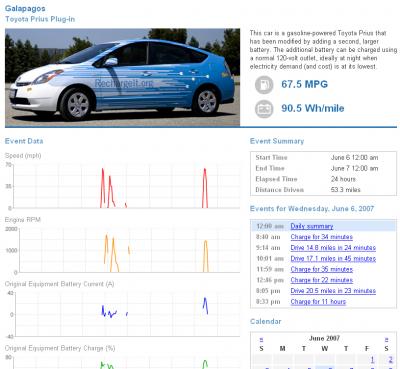
When you have as much money as Google, and your corporate slogan is “do no evil” it makes a lot of sense that you would set up a giant philanthropic organization to make the world a better place. We have covered Google.org before, in their efforts to make solar cheaper than coal, and promote plug-in hybrids.
Well now their mothers can be happy cause Google.org has itself a five year plan. In its continuing effort to use the power of information and technology to help people better their lives, Google.org has rolled out five core initiatives that will be the focus of its philanthropic efforts over the next five to ten years.
Yesterday’s announcement includes more than $25 million in new grants and investments to initial partners. The resources come from a commitment by Google’s founders to devote approximately 1 percent of the company’s equity plus 1 percent of annual profits to philanthropy, as well as employee time.
“In their first Letter from the Founders (2004), Larry Page and Sergey Brin said that we wanted to ‘make Google an institution that makes the world a better place.’ The work of Google.org will help us do that by applying Google’s strengths in organizing information and scaling technology to these complex issues,” said Sheryl Sandberg, VP Global Online Sales & Operations, and Google.org Board member.
Added Dr. Larry Brilliant, executive director of Google.org, “These five initiatives are our attempt to address some of the hard problems we as a world need to face in the coming decade. We have chosen them both because we think solving them will make a better, fairer, safer world for our children and grandchildren – and the children and grandchildren of people all over the world – but also because we feel that these core initiatives fit well with Google’s core strengths, especially its innovative technologies and its talented engineers and other Googlers, who are really our most valuable assets.”
Google.org five initiatives and initial partners include:
Predict and Prevent
Google.org supports efforts to empower communities to predict and prevent events before they become local, regional, or global crises, by identifying “hot spots” and enabling a rapid response. Rapid ecological and social changes are increasing the risk of emerging threats, from infectious diseases to drought and other environmental disasters. Google.org is initially focused on Southeast Asia and tropical Africa. In Southeast Asia, a hot spot for SARS and potentially bird flu, Google.org is working with partners to strengthen early warning systems and build local capacities to prevent the next pandemic. Initial grants include:
$5 million to InSTEDD (Innovative Support to Emergencies, Diseases and Disasters) to improve early detection, preparedness, and response capabilities for global health threats and humanitarian crises. InSTEDD will work with the community of relief and response organizations, governments, academia and top scientists around the world to address gaps in information flow with software and other technology-based tools and services. Acting as an innovation laboratory, InSTEDD aims to support the humanitarian community in preparing for and responding to global public health emergencies, working together towards a safer world. For more information, see http://instedd.org/.
$2.5 million to the Global Health and Security Initiative (GHSI), established by the Nuclear Threat Initiative to prevent, detect, and respond to biological threats. Google.org’s support will help GHSI to strengthen national and sub-regional disease surveillance systems through workforce training and better laboratory capacity in the Mekong Basin area (Thailand, Vietnam, Cambodia, Lao PDR, Myanmar, and Yunnan province, China). For more information, see http://www.ghsi.org/.
More than $600,000 to Clark University, with equal funding from the Gordon and Betty Moore Foundation, for Clark Labs to develop a system to improve monitoring, analysis and prediction of the impacts of climate variability and change on ecosystems, food and health in Africa and the Amazon. This system is a prototype platform to deploy global environmental, health, and development data, information and analysis tools that the global community can freely access over the Internet. For more information, see http://www.clarklabs.org/.
Inform and Empower to Improve Public Services
Google.org works with partners to improve the flow of vital information to improve basic services for the poor in India and East Africa. In many countries in the developing world, essential public services are failing, especially for the poorest members of society. Google.org supports efforts to provide information to empower citizens and communities, providers, and policy makers to improve the delivery of essential public services such as education, health, water and sanitation. Initial grants include:
$2 million to Pratham, a non-governmental organization in India, to create an independent institute that will conduct the Nationwide Annual Status of Education Report (ASER) as well as large scale assessments in the education sector. Our goal is to expand these types of assessments to other sectors. For more information, see http://www.pratham.org/.
$765,000 to the Centre for Budget and Policy Studies, a Bangalore-based analysis group, to create a Budget Information Service for local governments to facilitate better district- and municipal-level level planning in India. For more information, see http://www.cbpsindia.org/.
$660,000 to the Center for Policy Research, an action oriented think tank based in India, to increase the debate and discourse on issues of urban local governance and urban service delivery. With the rapid expansion of cities in India, our goal is to provide policy makers the necessary information to make more informed decisions. For more information, see http://www.cprindia.org/.
Fuel the Growth of Small and Medium-Sized Enterprises
Google.org supports efforts to lower transaction costs to invest in SMEs, create opportunities to access larger financial markets and make investments in this sector. SMEs are critical for inclusive economic growth and job creation in the developing world, but lack the capital and tools necessary to succeed. Many micro-enterprises and most large businesses have access to capital through microfinance institutions, banks and capital markets, but SMEs remain extraordinarily under served, creating a “missing middle.” Google.org wants to help increase the flow of capital to “the missing middle” by tackling some of the root causes that prevent these firms from becoming profitable investment opportunities. Technoserve is an initial partner:
$4.7 million grant to TechnoServe to provide general support to expand Technoserve’s efforts to support enterprises, spur job creation, and strengthen poverty alleviation programs globally, and to develop and implement a business plan competition to support entrepreneurs in Ghana and Tanzania. For more information see, http://www.technoserve.org/.
These three new efforts join two climate change related initiatives announced earlier this year:
Develop Renewable Energy Cheaper Than Coal (RE

This cross-Google collaboration has set a goal of producing one gigawatt of renewable energy capacity that is cheaper than coal, within years not decades. The initiative, known as RE
Accelerate the Commercialization of Plug-In Vehicles (RechargeIT)
RechargeIT is a Google.org initiative that aims to reduce CO2 emissions, cut oil use and stabilize the electrical grid by accelerating the adoption of plug-in hybrid electric vehicles and vehicle-to-grid technology. Google.org launched a $10 million request for investment proposals this Fall, and will invest amounts ranging from $500,000 to $2 million in selected for-profit companies whose innovative approach, team and technologies will enable widespread commercialization of plug-in hybrid electric vehicles, electric vehicles and/or vehicle-to-grid solutions.
Unlike conventional philanthropies, Google.org is a hybrid organization, giving it the flexibility either to make direct grants or invest in for-profit companies that might yield returns. Google.org can also lobby public officials in favor of policies supporting its goals.
Additional Google Giving
Beyond the grants and investments announced today under Google.org’s core initiatives, Google will continue its philanthropic work through programs to leverage Google products for non-profits, including: Google Grantsâ„¢, which donates free ads to non-profits; Google Appsâ„¢, which provides free, web-based services to non-profits; and contributions from departments including Google Earthâ„¢, which offers mapping to monitor events such as the crisis in Darfur.
